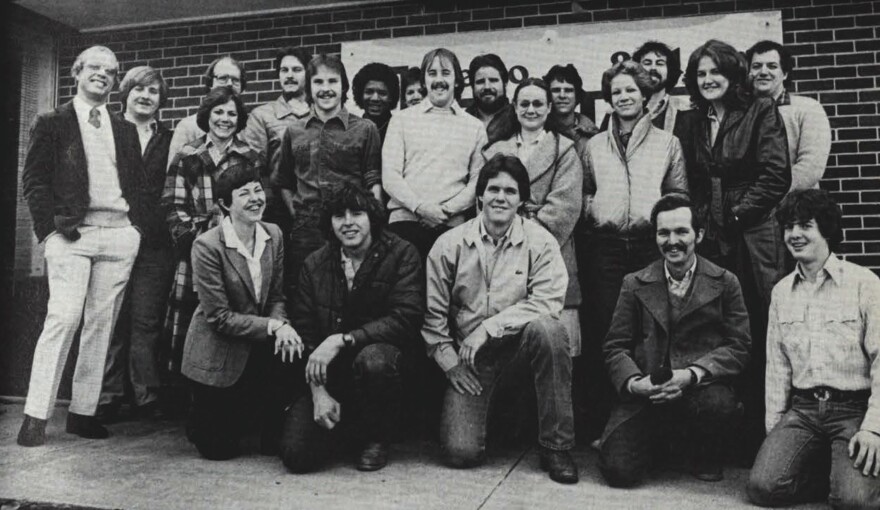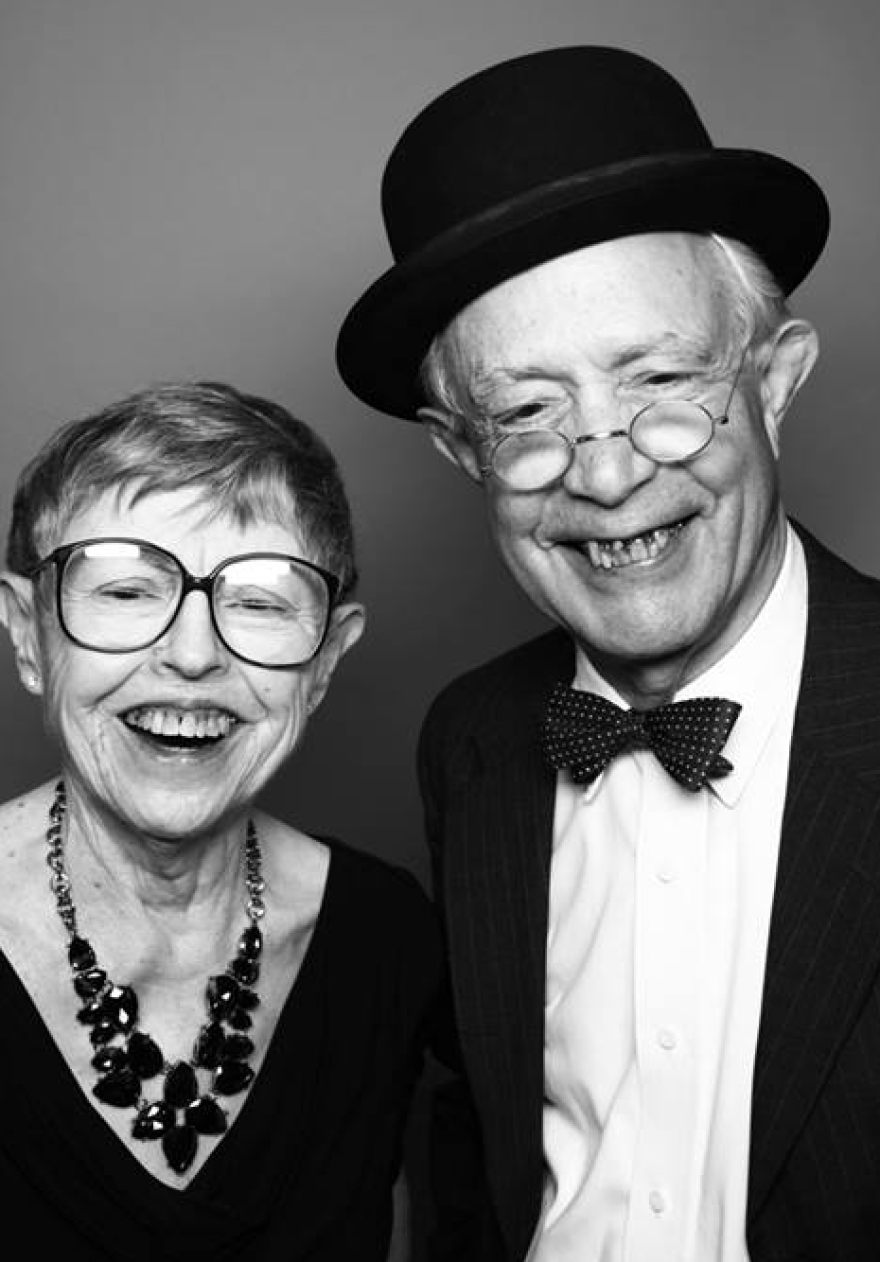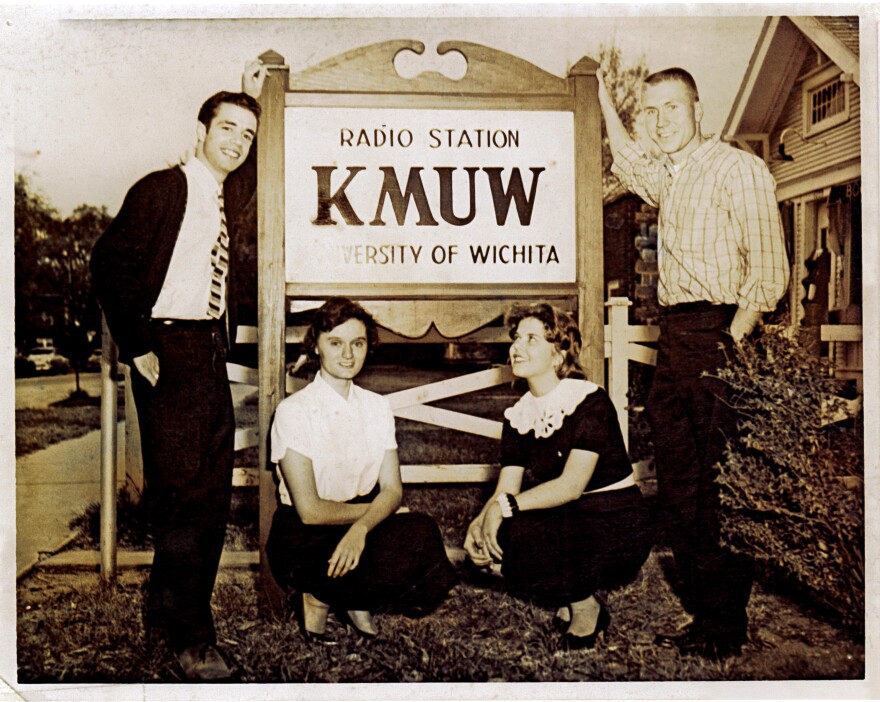Over several decades, Lance Hayes filled various roles at KMUW. He was a student with an on-air shift, a news director, a program director and a station manager. His wife, Pat, worked at the station for nearly 40 years.
Now a retired professor of radio, television and film at Wichita State University and Butler Community College, Hayes took a look back on KMUW's history as the station approaches its 70th birthday.
Interview Highlights

Starting at KMUW as a student in 1957
I was affiliated with KMUW as a student. I came to the the Municipal University of Wichita in 1957 and KMUW, of course, stands for the Municipal University of Wichita. This is before it was a state school. I was a theatre major. I heard there was also a radio station. I heard that they would let you try out to do that. KMUW was a student station. It was 10 watts — you could barely hear it down the street.
The first non-commercial station in America
This was the first nonprofit FM radio station in the country and so consequently there weren't very many FM radios back in the day. My future wife could tune to KMUW on her TV set if you played with the fine-tuning. I think on channel six or something like that, but few people had FM radios in their cars as well, but for the most part, it just wasn't common. We did have wired wireless which went to the girl's dormitory. And so over there, you could tune in to KMUW.

The KMUW farmhouse
The station was in an old farmhouse at the corner of 17th & Fairmount and we had just a very small control room with two turntables, one on each side of course. We had two reel-to-reel tape machines, which were a fairly new innovation at that time, and then a microphone and a desk there that was all built in.
Then there was a newsroom, which was next door. KMUW had an [Associated Press] machine so we could do newscasts. We generally did five-minute newscast every hour or two and that gave us a lot of practice as students as well.
We used to have a picture of Doris Day hanging on the wall. She had come through I think in 1949 or '50 and they had shown her the radio station. She autographed a picture to KMUW signed Doris Day.
The Christmas broadcast
In 1960, we did a whole Christmas special that ran for I think it was three hours, maybe four. We produced it all on reel-to-reel tape recording. None of it was live at the time. It had Christmas music, Christmas stories and even a little drama that ran 15 minutes that we produced with our own students there too. That was really strong in my memory. Particularly the little drama. It was “The Small One” about the donkey that Mary rode going into Bethlehem and there was a child involved who owned the donkey supposedly and ended up giving it to Joseph and Mary. My wife, Pat, played the little boy and I played Joseph in this Christmas story ... it's a very fond memory of mine.
Morning Edition at 40
I heard David Green the other day on Morning Edition saying, "Morning Edition is 40 years old this year," and I thought, "Well, I was here when Morning Edition first went on the air with Bob Edwards." Bob Edwards and Susan Stamberg were doing All Things Considered so they decided to put Morning Edition on the air and they were very popular co-anchors. Susan Stamberg retained All Things Considered and Bob Edwards moved into the morning, doing Morning Edition.
I remember at that time my wife was the development director and so she was helping promote some of this stuff and during the fundraisers, they had, at KMUW, coffee cups with Morning Edition on them. They were little plastic cups and I ended up making some tags for them saying, "Listen to Morning Edition." Again, it's amazing to me that 40 years have gone by with Morning Edition because I listen to it every day.

KMUW moves to Blake Hall
In 1980, we would move from the old farmhouse to a building that was right in between Fairmount and Holyoke. That's where, as I say when I was a student, why, it was the old Ted and Gene’s Diner. But the university renovated it so we moved because I remember we had a Saturday morning where everybody was there and we were hauling records because it was the old 78‚ 33 1/3 and the 45 RPM LPs that we carried over in big boxes to the new building. About that time, we also got a satellite so we were moving up in the world in terms of quality with our broadcasting.
Dan Taylor, jazz host
We were looking for somebody who could really handle the jazz and again we were going beyond students at that point, and so we hired Dan Taylor. He knew his onions when it came to jazz for sure and so he was on the air doing that for quite a long time.
After Midnight
We had a show called After Midnight, which was all student done, and it was all cutting edge music, if you will. This was when music was starting to shift and freedom of speech was suddenly being applied and every once in a while we’d get a record in and I had to go through and figure out what cuts on that album could be played and what cuts couldn’t. That was a very popular show. I know even high school kids ... they would put on the earbuds at night and listen to that when they were supposed to be sleeping. It had a lot of the students in it.

Dennis Shaw and gospel
Brother Dennis Shaw did the gospel show on Sunday mornings. During the fundraisers, literally a quarter of the money that we raised came from that one show. The community really supported Gospel Express and Brother Dennis Shaw.
Being involved through the years
My wife, Pat, kept me involved very closely and she worked here almost 40 years herself, so consequently, this is one of those things where I have seen the station changed so much in that time. With moving into a more professional crew, and of course, KMUW does interns now that enable students to come in here and get some professional experience.
Certainly KMUW these days is a fine part of the community. I really do believe and I certainly support it myself, strongly.



